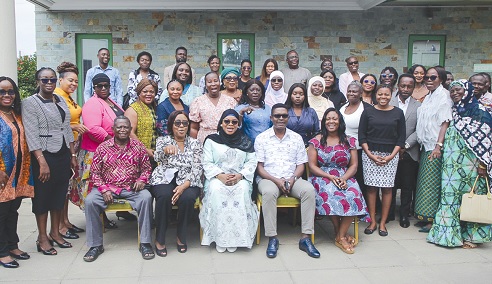The Institute for Democratic Governance (IDEG) has suggested the adoption of Mixed Member Proportional Representation, an electoral system, to help the country improve women's representation in decision-making positions.
A Senior Research Fellow with the IDEG, Kwasi Jonah, who made the suggestion, said the Mixed Member Proportional Representation allowed for the creation of women-only candidate elections to ensure greater female representation in local government.
He said the electoral system, which involved the inclusion of a certain percentage of women in Parliament, who did not represent specific constituencies, was more focused on national issues compared to those representing specific areas.
“IDEG has been advocating that at least at the district level, we try the Mixed Member Proportional Representation, where normal elections will continue, but then let us set aside a certain percentage of places for women,” he said.
He said such national representatives could collaborate with constituency-based representatives to address national problems.
He added that the current representation of women in governance was shameful and disgraceful, stating that even if the government was not ready for the Mixed Member Proportional Representation, they could abolish the 30 per cent government appointees and allocate an increased percentage to women to meet the affirmative action targets.
Efforts
Mr Jonah was speaking at a workshop jointly organised by the IDEG and Gender Centre for Empowering Development (GenCED) last Tuesday in Accra, to discuss how affirmative action could be implemented effectively.
The Deputy Presidential Spokesperson, Shamima Muslim, said the election of the country’s first female Vice-President, Professor Naana Jane Opoku-Agyemang, was a significant milestone in increasing women's representation in governance and leadership positions.
She mentioned, among others, the commemoration of African Women's Day and the launch of the Affirmative Action Law by the Ministry of Gender, Children, and Social Protection as some of the government’s efforts to increase women’s participation.
She added that the government had also passed the Social Protection Bill, underscoring the government's determination to ensure equity and social justice.
The Convenor of the Affirmative Action Law Coalition, Sheila Minkah-Premo, said the role of the gender equity committee was to assess institutions' compliance with gender equity standards.
She said a gender equity compliance certificate was issued to organisations that did not employ women, indicating non-compliance, adding that the process was part of the strategy to ensure compliance, especially for government institutions.
She indicated that a proposal had been submitted to the Constitutional Review Committee to amend the constitution to include gender quotas to address historical discrimination against women and other marginalised groups.
She said the amendment would lead to changes in the law to compel political parties to comply with gender equity standards.

